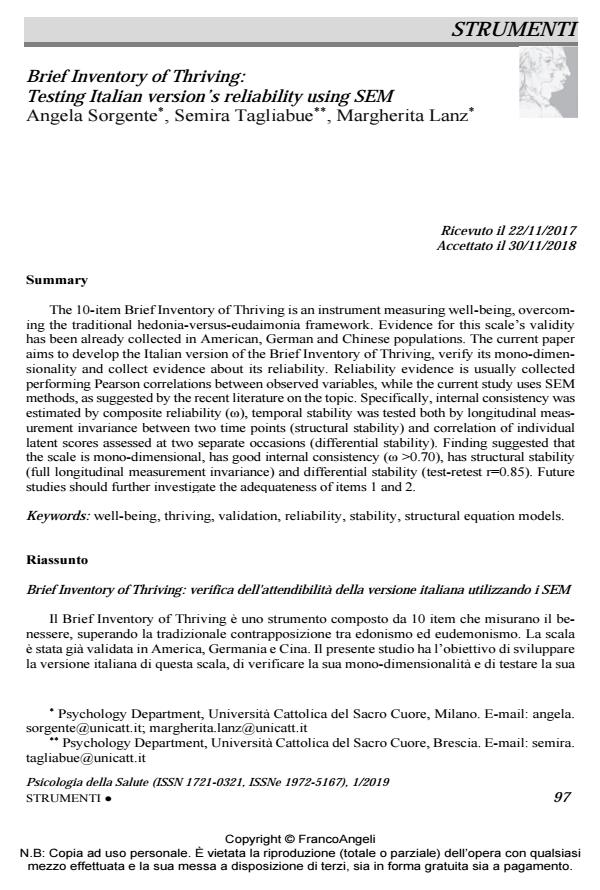Brief Inventory of Thriving: Testing Italian version’s reliability using SEM
Journal title PSICOLOGIA DELLA SALUTE
Author/s Angela Sorgente, Semira Tagliabue, Margherita Lanz
Publishing Year 2019 Issue 2019/1
Language English Pages 21 P. 97-117 File size 257 KB
DOI 10.3280/PDS2019-001006
DOI is like a bar code for intellectual property: to have more infomation
click here
Below, you can see the article first page
If you want to buy this article in PDF format, you can do it, following the instructions to buy download credits

FrancoAngeli is member of Publishers International Linking Association, Inc (PILA), a not-for-profit association which run the CrossRef service enabling links to and from online scholarly content.
The 10-item Brief Inventory of Thriving is an instrument measuring well-being, overcoming the traditional hedonia-versus-eudaimonia framework. Evidence for this scale’s validity has been already collected in American, German and Chinese populations. The current paper aims to develop the Italian version of the Brief Inventory of Thriving, verify its mono-dimensionality and collect evidence about its reliability. Reliability evidence is usually collected performing Pearson correlations between observed variables, while the current study uses SEM methods, as suggested by the recent literature on the topic. Specifically, internal consistency was estimated by composite reliability (?), temporal stability was tested both by longitudinal measurement invariance between two time points (structural stability) and correlation of individual latent scores assessed at two separate occasions (differential stability). Finding suggested that the scale is mono-dimensional, has good internal consistency (? >0.70), has structural stability (full longitudinal measurement invariance) and differential stability (test-retest r=0.85). Future studies should further investigate the adequateness of items 1 and 2.�
Keywords: Well-being, thriving, validation, reliability, stability, structural equation models.
- Brief Inventory of Thriving: Testing Italian version's reliability using SEM Angela Sorgente, Semira Tagliabue, Margherita Lanz, in PSICOLOGIA DELLA SALUTE 1/2019 pp.97
DOI: 10.3280/PDS2019-001006 - The multidimensional subjective financial well-being scale for emerging adults: Development and validation studies Angela Sorgente, Margherita Lanz, in International Journal of Behavioral Development /2019 pp.466
DOI: 10.1177/0165025419851859 - Gender, Age, and Cross-Cultural Invariance of Brief Inventory of Thriving Among Emerging Adults Angela Sorgente, Semira Tagliabue, Claudia Andrade, José Egidio Oliveira, Wenjie Duan, Margherita Lanz, in Measurement and Evaluation in Counseling and Development /2021 pp.251
DOI: 10.1080/07481756.2020.1827434 - The comprehensive inventory of thriving: a systematic review of published validation studies and a replication study Angela Sorgente, Michela Zambelli, Semira Tagliabue, Margherita Lanz, in Current Psychology /2023 pp.7920
DOI: 10.1007/s12144-021-02065-z - Employment Disruption and Wellbeing Among Young Adults: A Cross-National Study of Perceived Impact of the COVID-19 Lockdown Lijun Li, Joyce Serido, Rimantas Vosylis, Angela Sorgente, Žan Lep, Yue Zhang, Gabriela Fonseca, Carla Crespo, Ana Paula Relvas, Maja Zupančič, Margherita Lanz, in Journal of Happiness Studies /2023 pp.991
DOI: 10.1007/s10902-023-00629-3 - Novena Prayer Traditions, Thriving, and Well-being: A Survey of Churchgoers in an Indian City Samta P Pandya, in Journal of Psychology and Theology 00916471251400719/2026
DOI: 10.1177/00916471251400719 - The Financial Identity Scale (FIS): A multinational validation and measurement invariance study among emerging adults Angela Sorgente, Rimantas Vosylis, Margherita Lanz, Joyce Serido, Soeyon Shim, in International Journal of Behavioral Development /2020 pp.565
DOI: 10.1177/0165025420914986 - Psychometric properties of the English and Hindi versions of the Brief Inventory of Thriving for use among Indian adolescents Usama Ghayas Syed, Shikha Dixit, Margaret L. Kern, in Scientific Reports 31814/2024
DOI: 10.1038/s41598-024-83078-z - Meaning-Making Profiles During Emerging Adulthood: A Person-Oriented Approach in the Context of Romantic and Working Conditions Michela Zambelli, Semira Tagliabue, in Emerging Adulthood /2023 pp.242
DOI: 10.1177/21676968221111314
Angela Sorgente, Semira Tagliabue, Margherita Lanz, Brief Inventory of Thriving: Testing Italian version’s reliability using SEM in "PSICOLOGIA DELLA SALUTE" 1/2019, pp 97-117, DOI: 10.3280/PDS2019-001006